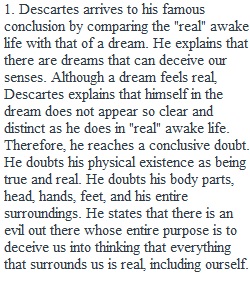


Q In his second Meditation, Descartes argues that even if he doubts everything he has ever known, the very process of doubting proves his existence as a thinking thing. How does Descartes arrive at his famous conclusion "I think therefore I am"? Do you think Descartes is correct to believe that he can be certain of his own existence? Why or why not? Please remember that you are required to submit two posts to this forum: one post answering the question and one post responding to the post of another student in the class.
View Related Questions